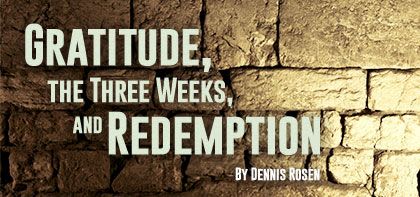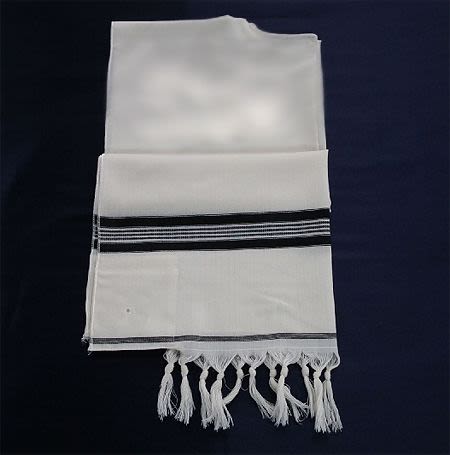
Gratitude, the Three Weeks, and Redemption
When we travel on the path of gratitude, the Evil Inclination sets up land mines and booby traps. How can we possibly succeed? Here are some simple suggestions...

The trouble began when the spies returned from their ill-fated mission and delivered a negative report about the land of Israel. All the people cried and complained. Hashem said, “I see you are crying for nothing. Now I’ll really give you something to cry about!” We’ve been suffering ever since.
You might wonder: Is it really fair for us to continue to suffer for sins committed by our ancestors over 3,000 years ago? The problem is, that we are still crying and complaining, and essentially committing the same root sin today. This is our national character defect. Rabbi Shalom Arush teaches that the only way to correct the sin of crying for nothing, is to thank Hashem for everything.
You can be sure that when we resolve to travel on the path of gratitude and positivity, the Evil Inclination will set up land mines, booby traps, and distractions. How can we possibly succeed? Here are some simple suggestions:
-
Rabbi Arush recommends we keep a gratitude journal and write down all the good things that happen to us each day. This is an extremely effective technique to ensure we notice and remember all the benevolence we receive. Each day in our personal prayers we can refer to these journal entries and give detailed thanks to Hashem. On Shabbos, when our main personal prayer priority is gratitude, we’ll have a whole week’s worth of kindness for which we can thank Hashem. Without the journal we’re likely to forget a lot of these gifts.
-
Work on saying blessings with joy and concentration. Each blessing starts with the words “Blessed are You, Hashem…” Rabbi Avigdor Miller says that the most important word is “You.” When we say a blessing, we must remember before Whom we stand. Our Benefactor is the King of the Universe. This should evoke feelings of awe and love.
Additionally, we should focus on the item for which we are expressing thanks and how much it means to us. Rabbi Miller also translates the beginning of every blessing as, “Thank you Hashem!” Indeed, so does Rabbi Arush; in the commentary in his latest siddur (prayerbook), he writes that “Baruch” means “I thank You.”
-
We say the blessing Modim (We thank You), three times a day in the Silent Prayer (Amidah), and repeat it during the morning and afternoon service. Before you start the Amidah, have in mind a kindness from Hashem that you experienced since the last time you prayed. When you begin the blessing Modim, bow and contemplate that kindness. This bowing with mindfulness will enhance your gratitude.
Over the course of a year we say this prayer hundreds of times. If you practice this consistently it will surely have a cumulative impact on your mind and heart.
-
A concept of paramount importance in Judaism is to remember the Exodus from Egypt and to appreciate the miraculous salvations we received from Hashem. Each of us have our own personal Egypts, i.e. situations where we were in dire straits and Hashem saved us. We should keep a list, review it often and thank Hashem profusely all the time for these miracles.
You can even jot these down in your siddur next to the third paragraph of the Shema where Hashem declares He is the One who brought us forth from the land of Egypt. Focus intensely on feeling gratitude for one of the personal redemptions on your list. This practice will also generate momentum before you begin praying the Amidah.
Shabbos is also a good time to review your list of personal salvations. During your personal prayers you can thank Hashem for saving you from painful and desperate situations over the course of the years.
-
Sometimes we look at what other people have that we don’t and become jealous or start to feel unhappy. We can change this focus by specifically noticing others who lack what we have and try to help them. For example, if you are happily married, think of those who have not yet found their soul mates. If you are healthy, think of those who are sick. You can pray for them, give them encouragement, and help them in many other ways. This will take your mind off your own issues and make you feel ever so grateful for the blessings you already possess. Remember that the things you take for granted, other people are praying for!
-
Periodically stop by a local hospital and look at the listing of the departments, Oncology, Cardiology, Psychiatry, etc. As you go down the list, pray for all the people that are in the hospital or receiving treatment for these conditions. Immediately afterwards say a prayer of thanksgiving to Hashem that you are not in the hospital for these problems and that you do not need the services of these doctors.
-
Our Sages teach that if we forget to thank others for the kindnesses that they do for us, eventually we will forget to thank Hashem also. Start thanking people in your family for the things they do for you and then work your way out in concentric circles. For example, we husbands should thank our wives for the many acts of kindness they do for us. Before you begin to thank her, be careful that your wife is sitting down in case she faints from the shock! Afterwards, say thank you to Hashem for giving you a wonderful life partner.
-
Stay away from complainers and negative people. Their talk is toxic and destructive to your health. Hang out with positive and grateful people. This will help inculcate their beneficial traits.
-
On Friday nights, at the Shabbos table, ask everyone to mention at least one or two things that happened during the past week for which they are grateful. This will not only make each person feel happier and closer to Hashem, but it will elevate everyone's feeling of gratitude and well-being on this holy day. Even more, since Shabbos is so holy, we receive extra merit for the good things done specifically on Shabbos. Every word of Torah, prayer, personal prayer, and yes – also thanking, is even more powerful on Shabbos!
Select a couple of these strategies and start trying to implement them. You will begin to feel the presence of Hashem in your life up close and personal. Even more, since all the destructions were caused by crying and complaining, then by working on your gratitude to Hashem, you are actively working to correct our national gratitude deficiency. You now have a part in rebuilding the Holy Temple! You are hastening the time when these three weeks will no longer be a time of mourning, but a time of great joy as we greet the arrival of the Moshiach and see the full redemption of our people, amen.










Tell us what you think!
Thank you for your comment!
It will be published after approval by the Editor.